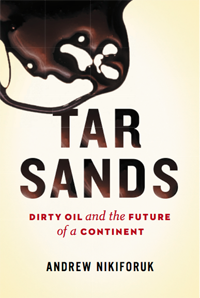 |
In opening his lecture at the Potter Auditorium Wednesday evening, award-winning journalist Andrew Nikiforuk jokingly promised вҖңlots of dirty pictures from Northern Alberta.вҖқ
He lived up to that promise and then some: in exploring the highlights of his latest book, Tar Sands: Dirty Oil and the Future of a Continent, Mr. Nikiforuk provided attendees with a sobering look at how the development of the Alberta tar sands has dramatically reshaped the Canadian economy and our system of government вҖ“ without, he argues, a national dialogue on what those changes represent.
вҖңCanada has become a вҖҳpetro stateвҖҷ in the past 10 years, without us even realizing it,вҖқ he said.
AlbertaвҖҷs tar sands вҖ“ Mr. Nikiforuk refuses to use the preferred вҖңoil sandsвҖқ term because heвҖҷs вҖңnever seen oil floating on sand beforeвҖқ вҖ“ represent the worldвҖҷs largest energy project. They have transformed Canada into the United StatesвҖҷ number one provider of crude imports, sending almost 2 billion barrels a day southwards. Back home, approximately 50 per cent of CanadaвҖҷs energy comes from the production of Albertan bitumen from the sands.
вҖңIf you were to shut down the tar sands today, the economy of Western Canada and much of the Midwest U.S. would die,вҖқ he proclaimed.
While he spent a good deal of time discussing the environmental implications of the sands, much of his talk concerned the economic and political changes they have brought. He noted the significant labour movements they have caused вҖ“ 14 per cent of Atlantic Canadians have moved west at some point to work in Alberta вҖ“ and the social effects brought with them both out west and here in our region. He particularly focused on the dramatic link between the value of the Canadian dollar and the price of oil and the increasing dependence of both the federal and provincial governments on oil revenue as opposed to tax dollars.
That dependence, he argued, means that efforts to combat climate change have been little more than token gestures, at best. He was highly critical of carbon capture as a long-term solution and also of the various climate change strategies that have been mapped out by the federal government thus far. вҖңWe burn money in Canada to fight climate change,вҖқ he sarcastically joked when discussing previous efforts, later adding: вҖңWeвҖҷre not serious. We really donвҖҷt give a damn.вҖқ
The core of his argument was that the development of the tar sands has taken place without a national, democratic argument on their implications. He believes that it is up to Canadians to start to change the conversation and actively engage their governments about what the tar sands mean for the future of our country. Until then, he argued, вҖңthey will not behave like governments. They will behave like oil executives.вҖқ
Andrew NikiforukвҖҷs tour through Nova Scotia concludes with appearances in Chester and Blockhouse. His lecture at РВјУЖВБщәПІКҝӘҪұЦұІҘ was presented by the College of Sustainability.
LINK: in National Geographic
